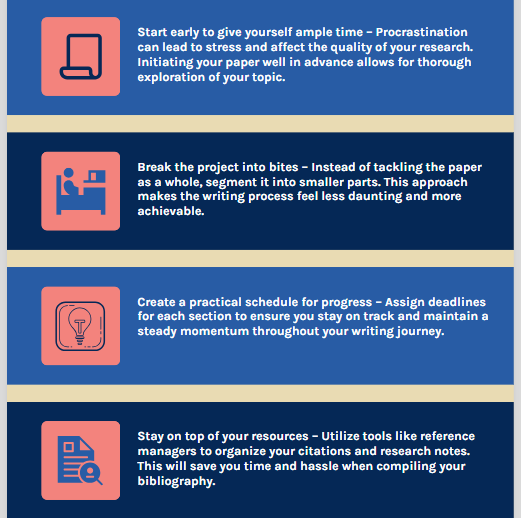
Table of Contents
Nursing research papers are essential for advancing the field of nursing, providing evidence-based practices, and improving patient care. A well-crafted nursing research paper not only demonstrates your understanding of the subject matter but also contributes to the body of knowledge in the nursing discipline.
While writing a strong nursing research paper can seem daunting, following these essential guidelines can ensure a high-quality, impactful, and impactful submission.
Step-by-Step Guide to Successful Nursing Research Paper Writing
1. Choosing a Topic and Defining Your Research Question:
The foundation of any successful nursing research paper lies in the choice of topic and the formulation of a clear, focused research question. This is where you define the scope of your investigation and set the stage for your research journey.
- Relevance: Choose a topic that is relevant to current nursing practice, patient care needs, and the existing body of research.
- Feasibility: Ensure that your topic is manageable and realistic given your resources, time constraints, and access to data.
- Specificity: Narrow down your topic to a specific and researchable question. A clear research question will guide your research and provide a framework for your findings.
- Clarity: State your research question in a clear and concise manner, avoiding ambiguity and complex jargon.
Example:
Instead of a broad question like “What are the effects of stress on nurses?” consider a more focused research question: “What is the relationship between perceived workload and burnout among registered nurses in acute care settings?”
2. Conducting Thorough Literature Review:
A comprehensive literature review forms the backbone of your nursing research paper, providing a foundation for your research and informing your methodology.
- Scope: Begin by identifying relevant keywords and search terms to locate pertinent research articles, books, and other credible sources.
- Critical Analysis: Go beyond simply summarizing existing research. Critically analyze the strengths and limitations of previous studies, identifying gaps in knowledge and potential areas for further investigation.
- Synthesis: Synthesize your findings, highlighting key themes and contrasting viewpoints. This step will help you identify your contribution to the existing body of literature.
- Organization: Organize your literature review logically, using a clear structure and appropriate headings and subheadings.
3. Selecting a Suitable Research Design:
The research design you choose will determine how you collect and analyze data to answer your research question. Different research designs are suited for different types of questions and data collection methods.
- Quantitative: This approach focuses on numerical data and statistical analysis, often using surveys, questionnaires, and objective measures to assess relationships and patterns.
- Qualitative: This approach explores subjective experiences, perspectives, and meanings through interviews, focus groups, observations, and document analysis.
- Mixed Methods: This design combines both quantitative and qualitative approaches, providing a more comprehensive understanding of the research topic.
4. Developing an Effective Methodology:
Once you have chosen your research design, you need to develop a robust methodology that ensures the rigor and validity of your nursing research paper.
- Sampling: Define your target population and choose an appropriate sampling method to ensure that your sample is representative of the population you are studying.
- Data Collection: Select data collection methods that are aligned with your research question and research design. Ensure that your methods are reliable, valid, and ethical.
- Data Analysis: Choose statistical or qualitative methods for data analysis that are appropriate for your research question and data type.
5. Ensuring Ethical Considerations:
Ethical considerations are paramount in any nursing research paper. You must adhere to ethical principles that safeguard the rights and well-being of participants.
- Informed Consent: Obtain informed consent from participants before collecting any data. Participants must understand the nature of the research, the potential risks and benefits, and their right to withdraw at any time.
- Confidentiality: Protect the confidentiality of participants’ data and ensure that their identities are not revealed.
- Beneficence: Ensure that the research benefits participants and does not cause them any harm.

6. Writing the Results Section:
The results section of your nursing research paper presents the findings of your research in a clear, concise, and objective manner.
- Organization: Structure your findings logically, following the flow of your research design.
- Tables and Figures: Use tables and figures to present data effectively and visually.
- Statistical Significance: If applicable, highlight statistically significant findings and their implications.
- Objectivity: Present the results objectively, avoiding bias or interpretation.
7. Interpreting the Findings:
The discussion section of your nursing research paper offers your interpretation of the findings and their significance.
- Key Findings: Summarize the main findings of your research and their relationship to the existing literature.
- Implications: Discuss the implications of your findings for nursing practice, policy, and future research.
- Limitations: Acknowledge the limitations of your study and their potential impact on the findings.
- Recommendations: Provide recommendations for future research or practice based on your findings.
8. Writing a Compelling Conclusion:
The conclusion of your nursing research paper is your final opportunity to synthesize your findings and leave a lasting impression on your reader.
- Reiterate Research Question: Begin by restating your research question and the main purpose of your study.
- Summarize Key Findings: Briefly summarize the key findings of your research and their significance.
- Implications for Practice: Discuss the implications of your findings for nursing practice and patient care.
- Future Research: Suggest directions for future research based on your findings and the limitations of your study.

9. Formatting and Style:
The formatting and style of your nursing research paper are crucial for ensuring clarity, readability, and professionalism.
- APA Style: Adhere to the guidelines of the American Psychological Association (APA) style for formatting, referencing, and citations.
- Professional Language: Use clear and concise language, avoiding jargon and technical terms unless they are necessary.
- Proofreading: Thoroughly proofread your paper for grammar, spelling, and punctuation errors.
Seeking Feedback and Revision
Before submitting your nursing research paper, it is essential to seek feedback from peers, mentors, or experts in your field.
- Peer Review: Ask colleagues or fellow students to review your paper and provide constructive criticism.
- Faculty Feedback: Seek guidance and feedback from faculty members who have expertise in your research area.
- Revisions: Carefully consider the feedback you receive and revise your paper accordingly to strengthen its clarity, logic, and impact.
Common Pitfalls in Nursing Research Papers and How to Fix Them
The realm of nursing research is vital for advancing patient care and improving healthcare outcomes. However, crafting a strong nursing research paper requires meticulous attention to detail and a thorough understanding of research methodology. Along the way, researchers often encounter common pitfalls that can significantly hinder the quality and impact of their work.
1. Lack of a Clear Research Question: A well-defined research question forms the foundation of any strong nursing research paper. Without a clear question, the study lacks direction and focus. This can lead to ambiguous findings and difficulty drawing meaningful conclusions.
Solution: Spend ample time crafting a research question that is specific, measurable, achievable, relevant, and time-bound (SMART). Ensure it aligns with the broader scope of your research and contributes to existing knowledge.
2. Inadequate Literature Review: A comprehensive literature review is crucial for identifying relevant research gaps, building upon existing knowledge, and providing context for your own research.
Solution: Conduct a thorough search using relevant databases and keywords. Analyze existing research critically, identifying strengths and weaknesses, and pinpointing areas where your nursing research paper can make a unique contribution.
3. Weak Methodology: The chosen methodology should be appropriate for answering the research question and ensuring rigor and validity.
Solution: Select a methodology that aligns with the nature of your research question. Clearly describe the chosen methods, including sampling techniques, data collection tools, and data analysis strategies. Justify your choices and address potential limitations.
4. Inadequate Data Analysis: Data analysis is the backbone of any nursing research paper. Inaccurate or incomplete analysis can distort findings and lead to flawed conclusions.
Solution: Employ appropriate statistical techniques to analyze your data based on your research question and methodology. Seek guidance from experts in statistical analysis if needed.
5. Poor Presentation and Writing Style: A nursing research paper needs to be clearly written and well-structured to effectively communicate your findings.
Solution: Pay meticulous attention to the structure of your paper, including the introduction, literature review, methodology, results, discussion, and conclusion. Use concise and precise language, avoiding jargon and ambiguous statements. Ensure clarity in presenting data and interpretations.
6. Insufficient Discussion of Implications: Beyond presenting findings, a strong nursing research paper should discuss the implications of the results for practice, policy, and future research.
Solution: Connect your findings to existing knowledge, highlighting their significance and potential applications in clinical settings. Discuss limitations and suggest future research directions that build upon your work.
7. Neglecting Ethical Considerations: Ethical considerations are paramount in nursing research, ensuring the safety and well-being of participants and the integrity of the study.
Solution: Ensure your research complies with ethical guidelines, including informed consent, confidentiality, and data security. Seek approval from relevant ethical review boards before commencing your study.
8. Ignoring the Target Audience: A successful nursing research paper caters to its target audience, which includes nurses, researchers, and other healthcare professionals.
Solution: Consider the needs and expectations of your audience when structuring and writing your paper. Use clear language, relevant examples, and a tone that resonates with the intended readership.
9. Inadequate Proofreading and Editing: Errors in grammar, spelling, and punctuation can detract from the credibility of your nursing research paper.
Solution: Proofread carefully, and consider seeking assistance from a professional editor. This will ensure your paper is polished and free of errors.
10. Lack of Originality: A nursing research paper needs to offer a fresh perspective, contributing to the existing body of knowledge.
Solution: Identify a unique research gap and develop a study that provides original insights. Clearly highlight your contribution and its impact on the field of nursing.
By understanding and addressing these common pitfalls, researchers can significantly improve the quality and impact of their nursing research papers. These papers play a crucial role in shaping clinical practice and guiding future research, ultimately contributing to the advancement of patient care. A well-crafted nursing research paper can make a substantial contribution to the field, ensuring that evidence-based practice becomes a cornerstone of healthcare.
Frequently Asked Questions about Nursing Research Papers
The nursing research paper is a critical component of many nursing programs and can be a daunting task for even the most seasoned student. With so many questions swirling in your head, it’s easy to feel overwhelmed. This section addresses some of the most frequently asked questions about nursing research papers, making the process a little less intimidating.
1. What is a Nursing Research Paper?
At its core, a nursing research paper is a scholarly work that investigates a specific issue or problem within the field of nursing. It uses scientific methods to collect and analyze data, drawing conclusions and contributing to the body of knowledge in nursing practice. This means you won’t be simply regurgitating information from textbooks; you’ll be actively contributing to the advancement of nursing science.
2. What are the Key Components of a Nursing Research Paper?
Every nursing research paper should follow a standardized structure, ensuring clarity and coherence. The key components include:
- Introduction: Provides context and background information on the research topic, clearly stating the research question and purpose.
- Literature Review: A comprehensive review of existing research on the chosen topic, highlighting gaps in current knowledge that your research aims to address.
- Methodology: A detailed description of the research methods employed, including the study design, data collection techniques, and analysis methods.
- Results: Presents the findings of the study in a clear and concise manner, using tables, graphs, and figures to visualize the data.
- Discussion: Interprets the research findings, placing them within the broader context of existing literature and discussing their significance for nursing practice.
- Conclusion: Summarizes the key findings and their implications, making recommendations for future research.
- References: A complete list of all sources cited in the paper, formatted according to the chosen style guide (e.g., APA, MLA).

3. How Do I Choose a Research Topic?
Choosing a relevant and interesting topic is crucial for a successful nursing research paper. Consider these strategies:
- Reflect on your personal interests: What areas of nursing are you most passionate about?
- Explore current nursing trends: What issues are impacting the healthcare landscape?
- Consult with your faculty advisor: They can guide you toward relevant and feasible research topics.
- Utilize online databases: Search for recent publications in nursing journals to identify areas of active research.
4. Where Can I Find Reliable Sources for My Research?
The quality of your sources is essential for a strong nursing research paper. Focus on reputable sources like:
- Academic Journals: Search databases like PubMed, CINAHL, and Scopus for peer-reviewed articles.
- Professional Organizations: Explore resources from organizations like the American Nurses Association (ANA).
- Government Websites: Look for data and reports from organizations like the Centers for Disease Control and Prevention (CDC).
- Books: Use textbooks and scholarly monographs to gain a deeper understanding of your chosen topic.
5. What are the Ethical Considerations in Nursing Research?
Ethical considerations are paramount in all nursing research papers. Always prioritize the well-being of participants and ensure informed consent, confidentiality, and data security.
6. How Can I Improve My Writing Skills for a Nursing Research Paper?
Writing a strong nursing research paper requires clear and concise language, logical flow, and adherence to academic conventions.
- Use a style guide: Follow the chosen style guide (e.g., APA) consistently throughout the paper.
- Focus on clarity: Use plain language and avoid jargon.
- Seek feedback: Get feedback from your faculty advisor and peers.
- Proofread carefully: Ensure there are no grammatical or spelling errors.
7. What are Some Tips for Completing a Nursing Research Paper Successfully?
- Start early: Don’t wait until the last minute to begin working on your paper.
- Break down the task: Divide the paper into smaller, manageable sections.
- Set realistic deadlines: Create a timeline for completing each section of the paper.
- Stay organized: Keep track of your sources and research findings using a reference manager.
- Don’t be afraid to ask for help: Reach out to your faculty advisor, librarians, or writing center staff for assistance.

Writing a nursing research paper can be challenging, but it’s also a rewarding experience. By understanding the key components, ethical considerations, and tips for success, you can navigate the process with confidence and produce a high-quality paper that contributes to the advancement of nursing knowledge. Remember, your faculty advisor and other resources are available to support you along the way. So, start researching, stay organized, and write your way to success!
Final Thoughts
Crafting a top-notch nursing research paper requires dedication, attention to detail, and adherence to ethical principles. By following these essential guidelines, you can ensure that your research is rigorous, impactful, and contributes to the advancement of nursing knowledge and practice.
Remember, the ultimate goal of any nursing research paper is to improve the quality of patient care and advance the field of nursing. By dedicating your time and effort to crafting a high-quality research paper, you will not only fulfil your academic requirements but also play a vital role in improving the lives of patients and advancing the nursing profession.
Hire Professional Nursing Research Paper Writing Service
Are you struggling with writing a stellar nursing research paper? Then, look no further than Nursing Papers. We offer professional writing services for nursing research papers, including topic suggestion, proofreading, editing, formatting and plagiarism removal. Besides nursing research papers, we can also help you with writing essays, case studies and dissertations. Get in touch with us today for original and top-notch nursing research papers.







